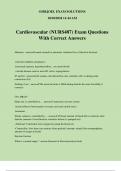©SIRJOEL EXAM SOLUTIONS
10/10/2024 11:44 AM
Cardiovascular (NURS487) Exam Questions
With Correct Answers
Murmurs - answer✔sounds created by abnormal, turbulent flow of blood in the heart
-innocent (children, pregnancy)
-functional (anemia, hyperthyroidism... too much blood)
-valvular disease (narrow and stiff valve= regurgitation)
S3 and S4 - answer✔soft sounds, extra blood flow into ventricles (S3) or during atrial
contraction (S4)
Starling's Law - answer✔The more the heart is filled during diastole the more forcefully it
contracts
CO= HRxSV
Heart rate is controlled by... - answer✔-autonomic nervous system
-neural reflexes (baroreceptors on aortic arch and carotid sinus)
-hormones
Stroke volume is controlled by... - answer✔-Preload: amount of blood left in ventricles after
diastole (amount of total blood in ventricles before it's pumped out)
-Afterload: Ventricular force required to pump the blood out
-Contractility: how heart can contract (from preload, inotropic stimuli like norepinephrine,
amount of oxygen to heart)
Ejection fraction
What is a normal range? - answer✔amount of blood ejected per beat/
, ©SIRJOEL EXAM SOLUTIONS
10/10/2024 11:44 AM
blood left at the end of systole
>65%
BP is determined by - answer✔cardiac output, blood volume, peripheral resistance
Hypertension - answer✔Sustained >140/90mmHg
Isolated Hypertension - answer✔Systolic >140
Diastolic 90 or less
primary hypertension - answer✔denotes high blood pressure from an unidentified cause; also
called essential hypertension
ie. increased Na+ intake, overactive RAAS syndrome
secondary hypertension - answer✔high blood pressure caused by the effects of another disease
ie. renal disease, endocrine or neuro. disorders, narrowing of aorta, sympathetic stimulants
Hypertensive crisis - answer✔>180 and/or >120mmHg
Emergency!
Symptoms of hypertensive crisis - answer✔headache, seizures, heart palpitations, altered LOC,
blurred vision, renal insufficiency (less urine)
How would you assess hypertensive crisis? - answer✔Changes in:
-Neuro
-Vision
-Heart
-Pulmonary (ie. edema)
-renal output (lowered)
Hypotension - answer✔<100/60mmHg
-caused by compromised CO or shifts in intravascular vol.
postural hypotension - answer✔decrease in blood pressure caused by a sudden change in position
(e.g., standing up suddenly) (altered for less than 3 minutes)
, ©SIRJOEL EXAM SOLUTIONS
10/10/2024 11:44 AM
Symptoms of hypotension - answer✔weakness, nausea, loss of consciousness, tachycardia or
possibly bradycardia
How would you assess hypotension? - answer✔-Neuro. (LOC, lethargic)
-CV (tachycardia, perfusion)
-Resps.
-Renal (reduced urine)
SHOCK - answer✔Not enough blood flow to tissues of the body
Types of shock (3) - answer✔-Cardiogenic (heart not pumping effectively)
-Hypovolemic (low blood... blood loss)
-Distributive (septic, anaphylaxis)
Symptoms of shock - answer✔Anxiety or agitation/restlessness, bluish lips and fingernails, chest
pain, confusion, dizziness, lightheadedness, faintness, pale, cool, clammy skin, low or no urine
output, sweating/moist skin
Angina (stable, variant) - answer✔-decreased blood flow in myocardial arteries
-Stable: effort induced, from arteriosclerosis or slow narrowing of arteries
-Variant: temporary spasm, from cold, emotions, medicines (usually in the mornings), elevated
ST
Stable angina treatments - answer✔-Ask about PQRST
-short or long acting nitrates
-B-blockers
-CCB's
-ACE inhibitors
Unstable angina - answer✔chest pain at rest or chest pain of increasing frequency
-arteriosclerosis plaque becomes complicated (transient vessel blockage!) --> emergency
Acute myocardial infarction - answer✔sustained ischemia leading to cell death
MI symptoms - answer✔-intense pain with pressure and tightness, shortness of breath, radiation




